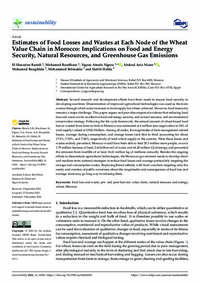Estimates of Food Losses and Wastes at Each Node of the Wheat Value Chain in Morocco: Implications on Food and Energy Security, Natural Resources, and Greenhouse Gas Emissions

Authors:
Several research and development efforts have been made to ensure food security in
developing countries. Dissemination of improved agricultural technologies was used as the main
avenue through which some increases in food supply have been achieved. However, food insecurity
remains a major challenge. This paper argues and provides empirical evidence that reducing food
loss and waste can be an effective food and energy security, and natural resource, and environmental
conservation strategy. Following the life cycle framework, the annual amount of wheat-based food
lost or wasted from farm-to-fork in Morocco was estimated at 4 million tons (equivalent to 36% of
total supply) valued at US$1.0 billion. Among all nodes, the magnitudes of farm management-related
losses, wastage during consumption, and storage losses rank first to third accounting for about
17.4%, 7.92%, and 7.06%, respectively of total wheat supply in the country. Were these losses and
wastes entirely prevented, Morocco would have been able to feed 29.3 million more people, or save
1.79 million hectares of land, 2.66 billion m3 of water, and 64.28 million GJ of energy, and prevented
the emission from landfills of at least 16.61 million kg of methane annually. Besides the ongoing
efforts to disseminate agricultural technologies, the Moroccan government needs to develop shortand medium-term national strategies to reduce food losses and wastage particularly targeting the
storage and consumption nodes. Replacing bread subsidy with food vouchers targeting only the
needy and creation of public awareness about the magnitudes and consequences of food loss and
wastage alone may go long way in reducing them
